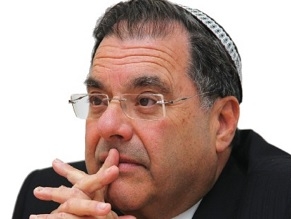|
World Jewish News

Rabbi Shlomo Riskin. (photo credit:MARC ISRAEL SELLEM/THE JERUSALEM POST)
|
Chief Rabbinate throws doubt on Riskin's continued tenure
25.05.2015, Israel A storm erupted on Monday when the Council of the Chief Rabbinate decided not to immediately renew the tenure of popular modern Orthodox Rabbi Shlomo Riskin as chief municipal rabbi of Efrat, generating vociferous objections from political and rabbinic quarters.
The council has requested that Riskin, 75, appear before the body for a hearing on whether his service as chief rabbi of Efrat should be extended for another five years before making its final decision.
The summons was criticized as being politically motivated and borne of the council’s opposition to Riskin’s advocacy on certain issues, particularly the highly contentious topic of conversion.
Riskin, who writes a regular essay on the weekly Torah portion for The Jerusalem Post Magazine, is extremely popular in the Gush Etzion settlement, which he helped found in 1983, as well as in the modern Orthodox community in Israel and the Diaspora.
The law states that municipal chief rabbis appointed between 1974 and 2007 who reach the age of 75 can obtain a five-year extension in their post before mandatory retirement.
Usually, this process is a mere formality, with the Council of the Chief Rabbinate deciding on tenure extensions without a need for the rabbis to be present.
Yet the Post has learned that several senior municipal chief rabbis on the council objected to an extension for Riskin and expressed opposition to his stance on conversion reforms during its monthly meeting on Monday.
Speaking to the Post, Riskin said he would be happy to attend a hearing, but added that he had heard of its possibility only through the media, saying it would have been more polite for the council to inform him personally.
Riskin also noted that his positions on matters of Jewish law should not be the reason for such a hearing.
“My position on conversion, which is completely in accordance with Jewish law, should not be cause for deliberating as to whether I should continue as chief rabbi of Efrat,” he told the Post.
The rabbi strongly supported measures enacted by the last government to allow municipal chief rabbis to establish their own conversion courts in order to liberalize the process and make it more accessible.
Although the measures were approved, Ashkenazi Chief Rabbi David Lau and Sephardi Chief Rabbi Yitzhak Yosef fiercely opposed them.
They are likely to be rendered obsolete in accordance with the coalition agreement between the haredi United Torah Judaism party and the Likud.
A spokesman for the Chief Rabbinate insisted that all rabbis are required to present themselves to the Council of the Chief Rabbinate when requesting an extension to their tenure, and that the decision not to immediately approve Riskin’s service should be considered normal. The spokesman said Riskin would receive formal notice of any hearing.
The ITIM religious services advisory and lobbying group said, however, that it was highly unusual for a municipal chief rabbi to be asked to appear before the council, and that tenure extensions were usually a formality.
Yesh Atid MK Aliza Lavie, who is modern Orthodox, said the development constituted “the pinnacle of the ongoing disconnect between the rabbinate and the people,” calling on Lau and Yosef to “show responsibility and retract the intention not to extend Rabbi Riskin’s tenure” in Efrat.
She added that the residents of Efrat were “completely satisfied with Riskin’s service... as are the converts he embraces, the women he encourages to teach Torah and rule on Jewish law, and anyone who wants a municipal chief rabbi to be more than a bureaucratic clerk but instead someone who takes upon himself spiritual responsibility to bequeath to Judaism a connection to the ongoing reality of our time and a broad and wise vision for the coming generations.”
The Tzohar rabbinical association described Riskin, a member, as “a true symbol of spiritual leadership.” It strongly condemned Monday’s developments.
“A clear red flag of revenge flies above any effort to depose Rabbi Riskin, directed against his positions and halachic decisions,” the association said in a statement.
“Rabbi Riskin, who has led the community of Efrat with love and dedication and is beloved by so many, is a true symbol of spiritual leadership,” the statement said. “Instead of lauding his accomplishments, figures in the rabbinate are choosing to force the rabbi into early retirement because of their political considerations and apparently so that they can appoint insiders in his place.”
The local religious council of Efrat also issued a statement, saying that it would continue to view Riskin as the city’s chief rabbi regardless of the Chief Rabbinate’s decision, and that it would work to block the election of any other rabbi in his place.
By JEREMY SHARON
JPost.com
|
|
